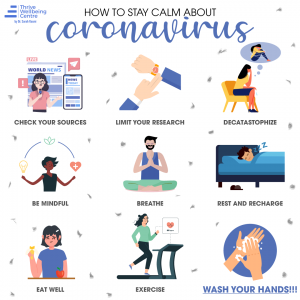By Cheshta Bhatia

We, as humans, are hard wired with the urge to know everything that life holds for us. We like to plan our every action, think about the reactions life can have to those actions, and sketch out how we would manage those situations. This is something very fundamental to human behaviour. In times of COVID, when nothing seems to be under our control, it gives us anxiety. Many of us are not able to meet our best productivity levels, leading to rise in frustration. In addition to this, social isolation can lead to a reduced desire for social interaction. A similar study by researchers at the Wolfson Institute for Biomedical Research and Sainsbury Wellcome Centre, University College London demonstrates a difference in brain activity between social zebrafish which were isolated from other fishes (referred as the “lonely” fish) as compared to the zebrafish who are averse to social cues, but not isolated from other fishes (“loner” fish). They observe hypersensitivity and increased activation of brain regions associated with stress in the lonely fish than the loner1. These brain activity differences were mainly observed in the hypothalamus, the brain region responsible for releasing hormones and maintaining homeostasis in humans. In simpler words, lonely fish became overwhelmed when exposed to social interaction, and hence had to experience negative effects post isolation. Humans are social animals and can learn from the brain activity of zebrafish. This study indicates the anxiousness and reduced social preference that humans might have to deal with, once the social interaction and normal lives restore. Hence, the battle with anxiety and depression is a long one this time, but important thing is to remember that you are not alone. COVID-19 is a global pandemic, and no one is expected to perform their best. We are all together in this.

https://www.namikenosha.org/anxiety-disorder.html
Coping with COVID anxiety
Uncertainties are not easy to deal with; You might be tensed about catching the virus, your job plans being cancelled, disruption of your daily routine, financial crisis. Before you know how to manage these feelings, you need to understand some signs and symptoms of anxiety :

https://www.verywellmind.com/top-symptoms-of-panic-attacks-2584270
Anxiety disorders include panic attacks, which can be very sudden and can be triggered even in the absence of a real danger or apparent cause2. The worst is the constant fear that a person who has experienced panic attack lives with. Sufferers start living with fearful anticipation of future attacks. In 2017, 44.9 million people suffered from anxiety disorders in India3. The positive thing is that anxiety disorders including panic attacks are curable, but we need to talk about it. We need to tell others that we need help. The best way to proceed is to seek professional help by talking to therapists, however, I will list some practices which can be done in addition to seeking professional help and can be helpful in managing anxiety.
Tips for Managing Anxiety:

https://adaa.org/finding-help/coronavirus-anxiety-helpful-resources
This pandemic has challenged us in more ways than we thought, mainly affecting our mental health. Let’s together fight against the social stigma associated with mental health. Let’s be kind to each other, take care of ourselves and every one around us. Asking for help does not make you vulnerable, it makes you strong. It inspires hundreds of others to seek help. Mental health is as important as any other form of physical health. Just as a heart condition requires cardiologist, a mental health condition requires psychologists and psychiatrists. Let’s not treat our mind any different from the rest of our body.
REFERENCES